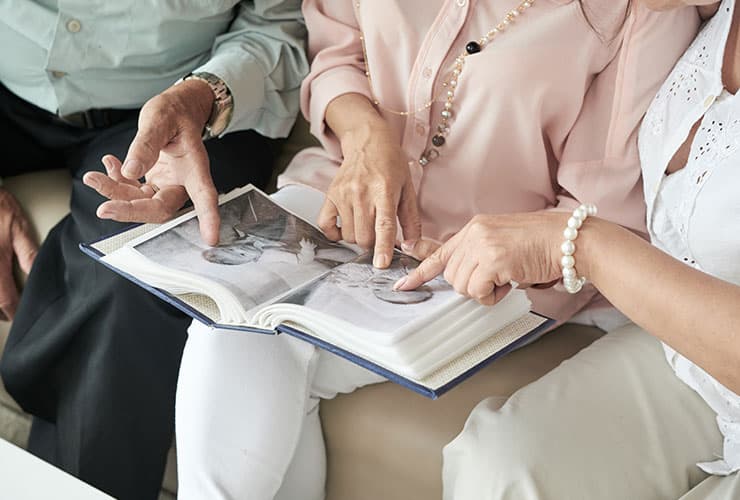Dire Conjugation could surely be very helpful to you when starting a conversation with someone coming from Italy.
Dire is one of the most well-known Italian verbs you can’t do without: it’s primarily employed to report what people say or just said, to tell stories and so on. Moreover, it is considered as a verb of third conjugation because it ends in -ire. Apart from being an irregular verb, it also has various equivalents in English: to say, tell, recite and even talk.
To better understand what we are talking about, look at the following examples:
Perché non mi hai detto dell’audizione?
Why didn’t you talk to me about the audition?
Allora, che ti ha detto? È ancora arrabbiata con me, non è vero?
So, what did she tell you? She’s still mad at me, isn’t she?
Dire Conjugation – Presente

First of all, we have to say that dire has an irregular conjugation. For this reason, you should learn it by heart. Let’s begin with the Presente, one of the most used Italian tenses to indicate habits or actions that are happening right now:
| Io dico |
| Tu dici |
| Lui / Lei dice |
| Noi diciamo |
| Voi dite |
| Loro dicono |
Examples:
Dico solo che dovresti essere più gentile con il tuo patrigno.
I’m just saying you should be kinder to your stepfather.
Margot dice che stasera verrà a cena con il suo nuovo ragazzo.
Margot says that she is coming for dinner tonight with her new boyfriend.
Fun fact: did you know that Italians sometimes get confused when they have to employ dite in a sentence? Some of them often make a mistake by saying dicete instead of dite. As you can see, in the conjugation of dire in the present tense, the consonant c occurs in every person, except in the second plural. For this reason, you might be mistaken. Therefore, pay attention when using the verb in the Presente!
Dire Conjugation – Passato Prossimo
| Io ho detto |
| Tu hai detto |
| Lui / Lei ha detto |
| Noi abbiamo detto |
| Voi avete detto |
| Loro hanno detto |
Going on, we can bump into Passato Prossimo, tense employed when mentioning actions that happened in the recent past. Like many other verbs, dire also requires the auxiliary to have.
Examples:
Che cosa ti ha detto quando vi siete rivisti?
What did he tell you when you ran into each other again?
Matthew mi ha detto che trascorrerà le vacanze di Natale con noi.
Matthew told me he is spending Christmas holidays with us.
Dire Conjugation – Imperfetto
| Io dicevo |
| Tu dicevi |
| Lui / Lei diceva |
| Noi dicevamo |
| Voi dicevate |
| Loro dicevano |
Instead, you resort to Imperfetto in Italian when wanting to report past habits or actions in progress in the past.
Examples:
I tuoi genitori dicevano che sarebbe venuto a trovarci.
Your parents said they would come to visit us.
Diceva sempre la verità ma comunque nessuno gli credeva.
He always used to tell the truth but no one believed him anyway.
Dire Conjugation – Trapassato Prossimo

| Io avevo detto |
| Tu avevi detto |
| Lui / Lei aveva detto |
| Noi avevamo detto |
| Voi avevate detto |
| Loro avevano detto |
Concerning Trapassato Prossimo, this tense is basically applied when referring to an event that occurred before another one in the past. To form it, you need the simple past of avere, together with detto, the past participle of dire.
Examples:
Non mi avevi detto che sarebbe venuto anche Lea a Roma.
You hadn’t told me that Lea would come to Rome, too.
Si rattristava pensando a quello che le avevano detto.
She got sad when she thought about what they said to her.
Dire Conjugation – Passato Remoto
| Io dissi |
| Tu dicesti |
| Lui / Lei disse |
| Noi dicemmo |
| Voi diceste |
| Loro dissero |
Let’s move now to Passato Remoto, one of the less appreciated and vanishing tenses in Italian grammar. You are required to employ it in case you wish to talk about facts that happened a long time ago.
Examples:
Dicesti di volerti trasferire all’estero. Perché non l’hai fatto?
You told me you wished to move abroad. Why didn’t you do that?
Le dicemmo di rivolgersi a Maurizio in caso di necessità.
We told her to address Maurizio if she needed to.
Dire Conjugation – Trapassato Remoto
| Io ebbi detto |
| Tu avesti detto |
| Lui / Lei ebbe detto |
| Noi avemmo detto |
| Voi aveste detto |
| Loro ebbero detto |
Before using this tense, you need to know that Trapassato Remoto has almost disappeared in the spoken language. Nowadays, you can find it only in documentaries, literature and novels. Being a compound tense, it is composed by the auxiliary (in this case to have) in the Passato Remoto and the past participle of the main verb.
Examples:
Dopo che gli ebbe detto che era finita, incominciò a piangere.
After she had told him they were done, he started to cry.
Dopo che avemmo detto a tutti quello che era successo, nessuno osò ribattere.
After we had said to everyone what had happened, no one dared to reply.
Dire Conjugation – Futuro Semplice

| Io dirò |
| Tu dirai |
| Lui / Lei dirà |
| Noi diremo |
| Voi direte |
| Loro diranno |
On the contrary, Italian Futuro is often replaced by the present tense. Anyway, you are suggested to employ it when pointing out events that have yet to happen (Futuro Semplice) or a fact that will be finished before another one takes place (Futuro Anteriore).
Examples:
Se gli chiedessi di accompagnarti, sono certo che ti dirà di sì!
If you asked him to accompany you, I’m sure he’ll tell you yes!
Credi che ti dirà la stessa cosa anche questa volta?
Do you believe she will tell you the same thing once again?
Dire Conjugation – Futuro Anteriore
| Io avrò detto |
| Tu avrai detto |
| Lui / Lei avrà detto |
| Noi avremo detto |
| Voi avrete detto |
| Loro avranno detto |
Examples:
Carole e Stephan vi avranno certamente detto che si sposeranno l’anno prossimo.
Carole and Stephan definitely told you they are getting married next year.
Ti avrà detto del suo nuovo vicino di casa, no?
He must have talked to you about his new neighbor, right?
As you can notice, in the second example dire has been used in the place of the verb to talk. This mostly happens on informal occasions.
Dire Conjugation – Congiuntivo Presente
Similarly, Italians avoid employing Congiuntivo in favor of the present and past tenses of the indicative mood. This happens because its formation is quite complex. In addition, its use is less and less frequent, especially among youngsters. However, it still appears in the written language (chiefly in formal contexts) and the educational field. Furthermore, its main feature is the conjunction che preceding the conjugated verb.
| Che io dica |
| Che tu dica |
| Che lui / lei dica |
| Che noi diciamo |
| Che voi diciate |
| Che loro dicano |
Examples:
Vuole che tu gli dica chi verrà alla festa di Christopher.
He wants you to tell him who is coming to Christopher’s party.
Spero che ci dicano dove andranno questo weekend.
I hope they will tell us where they are going this weekend.
Dire Conjugation – Congiuntivo Passato

| Che io abbia detto |
| Che tu abbia detto |
| Che lui / lei abbia detto |
| Che noi abbiamo detto |
| Che voi abbiate detto |
| Che loro abbiano detto |
Examples:
Penso che abbia detto di non voler essere disturbata.
I think she said she didn’t want to be bothered.
Dubito seriamente che glielo abbiano detto.
I seriously doubt that they said it to him.
Dire Conjugation – Congiuntivo Imperfetto
| Che io dicessi |
| Che tu dicessi |
| Che lui / lei dicesse |
| Che noi dicessimo |
| Che voi diceste |
| Che loro dicessero |
Examples:
E se ti dicessi che ieri sono uscito con la tua ex?
What if I tell you yesterday I hung out with your ex?
Speravo che ce lo dicessero i nostri amici, non i nostri genitori!
I hoped that our friends told it to us, not our parents!
Dire Conjugation – Congiuntivo Trapassato
| Che io avessi detto |
| Che tu avessi detto |
| Che lui / lei avesse detto |
| Che noi avessimo detto |
| Che voi aveste detto |
| Che loro avessero detto |
Examples:
Mi pareva che avesse detto di essere nato in Australia.
It seems to me that he said he was born in Australia.
Pensavo che avessero detto che sarebbero passati più tardi.
I thought they had said that they would come over later.
Dire Conjugation – Condizionale Presente
Speaking about Italian Condizionale, you are suggested to apply it when expressing wishes, intentions, and polite requests. In most cases, you can employ it in combination with Congiuntivo to build hypothetical sentences.
| Io direi |
| Tu diresti |
| Lui / Lei direbbe |
| Noi diremmo |
| Voi direste |
| Loro direbbero |
Examples:
Cosa direbbe se sapesse che in questo momento sei qui con me?
What would he say if he knew that you are here with me now?
Direi che Cristina è la persona più adatta a ricoprire questo ruolo.
I would say that Cristina is the right person to cover this role.
Dire Conjugation – Condizionale Passato

| Io avrei detto |
| Tu avresti detto |
| Lui / Lei avrebbe detto |
| Noi avremmo detto |
| Voi avreste detto |
| Loro avrebbero detto |
Examples:
Mi hai promesso che lo avresti detto prima a noi, poi agli altri!
You promised me you would mention it to us first, then to the others!
Se non vi avesse invitato al suo addio al celibato, che cosa avreste detto?
If he hadn’t invited you to his bachelor party, what would you have told?
Dire Conjugation – Imperativo
In case you want to give orders, instructions, suggestions, or advice to someone, you are called to apply Imperativo. Since dire doesn’t follow the general rules of conjugation, you need to resort to its forms.
| Dì (tu) |
| Dica (Lei) |
| Diciamo (Noi) |
| Dite (Voi) |
| Dicano (Loro) |
Examples:
Dì quello che devi dire e poi vai via!
Just say what you have to say and then leave!
Dica quello che Le pare! Non posso farla accomodare comunque!
She can say whatever she wants! I can’t make her sit by the way!
Remember that you need a further –m / –c when employing the indirect object pronouns mi / ci at the second person singular.
Examples:
Dimmi che mi amerei per sempre e che non mi tradirai mai.
Tell me you will always love me and you will never cheat on me.
Dicci che andrà tutto bene e che staremo meglio.
Tell us that it will be ok and we’ll be better off.
Dire Conjugation – Infinito
| Present tense | Past tense |
| Dire | Aver detto |
Examples:
Un antico proverbio recita: “tra il dire e il fare c’è di mezzo il mare”.
As an old saying goes: “easier said than done”.
Dopo averle detto come stavano realmente le cose, sorrise.
After telling her how things really were, she smiled.
Dire Conjugation – Participio
| Present tense | Past tense |
| Dicente | Detto |
Examples:
Chi è il prete dicente messa stamattina?
Who’s the priest officiating at mass this morning?
Detto ciò, possiamo andare a dormire e riparlarne domani.
After saying that, we can go to sleep and talk about it again tomorrow.
Note that the form dicente is quite obsolete.
Anyway, it is mainly employed in very formal contexts. If not necessary, you better not use it!
Dire Conjugation – Gerundio
Finally, we can find Gerundio, another tense you don’t use in Italian very often. Generally, it occurs in sentences in the present progressive.
| Present tense | Past tense |
| Dicendo | Avendo detto |
Examples:
Ma che cosa stai dicendo? Sei matto?
What are you saying? Are you insane?
Avendo detto a Piero che sto male, è passato a trovarmi.
Having told Piero I’m sick, he came to visit me.
Now that you are able to conjugate and use dire properly, dimmi qualcosa and let’s start talking to each other!































































